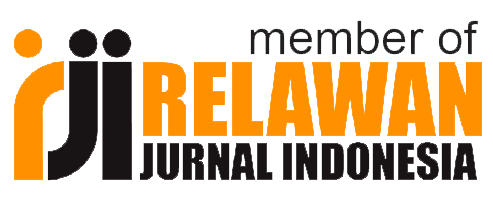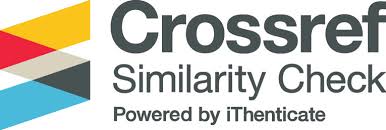A Questionnaire Development and Validation about Public Knowledge of Chronic Kidney Disease
Abstract
To reduce the prevalence of chronic kidney disease, a pillar of health paradigms through community empowerment has been introduced. Society with profound knowledge of such disease has proved to be able to raise awareness of kidney disease early detection. Meanwhile, limited data on public knowledge of chronic kidney disease make the education programs in health promotion seem ineffective. This study therefore aims to develop a questionnaire with high validity and reliability to assess public knowledge of this disease.
The development included five stages of conceptualisation, instrument construction, a trial with Study 1 of 240 medical and non-medical students and Study 2 of 300 participants from Sleman Regency in Yogyakarta, a test of the revision, and an analysis using the Cronbach’s alpha reliability test. A validity test compared this questionnaire with another reliable questionnaire.
Both studies yielded a knowledge scale with two variables comprising kidney disease knowledge (risk factors, causes, symptoms, management) and kidney disease prevention knowledge with Cronbach’s alpha of 0.623 and 0.703 (Study 1) and 0.361 and 0.545 (Study 2). This has proved that the preliminary psychometric evidence (factor structure, reliability, convergent validity) satisfied the requirements for an instrument used to measure public knowledge of chronic kidney disease.
References
[2] Humas BPJS Kesehatan. Buletin Info BPJS Kesehatan 2020;77:24.
[3] Ningrum VDA, Yuantari R, Medisa D, Kurniawan IN. The Effects of Education Models on the Improvement of Public Knowledge of Chronic Kidney Disease. Journal Of The Indonesian Medical Association 2022;72:31–43. https://doi.org/10.47830/jinma-vol.72.1-2022-611.
[4] Sunarti S, Andayani TM. The Effect of Pharmacist Education on The Level of Asthma Control. Jurnal Farmasi Indonesia 2015;12:85–93. https://doi.org/10.31001/jfi.v12i1.82.
[5] Kristiyanti AAM, Widayati A. Persepsi Masyarakat Tentang Swamedikasi: Studi Kualitatif Dengan Theory of Planned Behavior. Jurnal Farmasi Indonesia 2022;19:181–92. https://doi.org/10.31001/jfi.v19i1.1499.
[6] White SL, Polkinghorne KR, Cass A, Shaw J, Atkins RC, Chadban SJ. Limited knowledge of kidney disease in a survey of AusDiab study participants. Medical Journal of Australia 2008;188:204–8. https://doi.org/10.5694/j.1326-5377.2008.tb01585.x.
[7] Ningrum VDA, Ikawati Z, Sadewa AH, Ikhsan MR. Kontrol Glikemik dan Prevalensi Gagal Ginjal Kronik pada Pasien Diabetes Melitus Tipe 2 di Puskesmas Wilayah Provinsi DIY Tahun 2015. Indonesian Journal of Clinical Pharmacy 2017;6:78–90. https://doi.org/10.15416/ijcp.2017.6.2.78.
[8] Sukawati NW. The Perbandingan Kuesioner EQ-5D-5L dan SF-6D untuk Mengukur Kualitas Hidup Pasien Penyakit Ginjal Kronik di RSUD Kota Yogyakarta. Jurnal Farmasi Indonesia 2021;18:200–5. https://doi.org/10.31001/jfi.v18i2.715.
[9] Gheewala PA, Peterson GM, Zaidi STR, Jose MD, Castelino RL. Public knowledge of chronic kidney disease evaluated using a validated questionnaire: a cross-sectional study. BMC Public Health 2018;18:371. https://doi.org/10.1186/s12889-018-5301-4.
[10] Younes S, Mourad N, Safwan J, Dabbous M, Rahal M, Al Nabulsi M, et al. Chronic kidney disease awareness among the general population: tool validation and knowledge assessment in a developing country. BMC Nephrol 2022;23:266. https://doi.org/10.1186/s12882-022-02889-2.
[11] Wei C-J, Shih C-L, Hsu Y-J, Chen Y-C, Yeh J-Z, Shih J-H, et al. Development and application of a chronic kidney disease-specific health literacy, knowledge and disease awareness assessment tool for patients with chronic kidney disease in Taiwan. BMJ Open 2021;11:e052597. https://doi.org/10.1136/bmjopen-2021-052597.
[12] Wright JA, Wallston KA, Elasy TA, Ikizler TA, Cavanaugh KL. Development and Results of a Kidney Disease Knowledge Survey Given to Patients With CKD. Am J Kidney Dis 2011;57:387–95. https://doi.org/10.1053/j.ajkd.2010.09.018.
[13] Chow WL, Joshi VD, Tin AS, van der Erf S, Lim JFY, Swah TS, et al. Limited knowledge of chronic kidney disease among primary care patients – a cross-sectional survey. BMC Nephrology 2012;13:54. https://doi.org/10.1186/1471-2369-13-54.
[14] Khalil A, Abdalrahim M. Knowledge, attitudes, and practices towards prevention and early detection of chronic kidney disease. International Nursing Review 2014;61:237–45. https://doi.org/10.1111/inr.12085.
[15] Kumela Goro K, Desalegn Wolide A, Kerga Dibaba F, Gashe Fufa F, Wakjira Garedow A, Edilu Tufa B, et al. Patient Awareness, Prevalence, and Risk Factors of Chronic Kidney Disease among Diabetes Mellitus and Hypertensive Patients at Jimma University Medical Center, Ethiopia. Biomed Res Int 2019;2019. https://doi.org/10.1155/2019/2383508.
[16] Iqbal M, Hossain RM, Hossain K, Faroque MO, Iqbal S, Islam S. Knowledge, Attitude and Perception about Kidney Disease and Renal Transplantation among Care Givers of CKD Patients. Transplantation 2018;102:S817. https://doi.org/10.1097/01.tp.0000543859.97277.4c.
[17] Choukem S-P, Nchifor PK, Halle M-P, Nebongo DN, Mboue-Djieka Y, Kaze FF, et al. Knowledge of physicians on chronic kidney disease and their attitudes towards referral, in two cities of Cameroon: a cross-sectional study. BMC Res Notes 2016;9. https://doi.org/10.1186/s13104-016-1845-5.
[18] Cohen RJ, Swerdlik MW. Psychological testing and assessment: An introduction to tests and measurement. 9th ed. New York: McGraw-Hill Education; 2018.
[19] KDIGO. Clinical Practice Guideline for the Evaluation and Management ofChronic Kidney Disease. ISN 2013;3.
[20] Perhimpunan Nefrologi Indonesia. Pedoman Pelayanan Hemodialisis di Sarana Pelayanan Kesehatan 2008.
[21] Perhimpunan Nefrologi Indonesia. Konsensus Transplantasi Ginjal 2011.
[22] Bello AK, Nwankwo E, El Nahas AM. Prevention of chronic kidney disease: A global challenge. Kidney International 2005;68:S11–7. https://doi.org/10.1111/j.1523-1755.2005.09802.x.
[23] Vika V, Siagian M, Wangge G. Validity and reliability of Morisky Medication Adherence Scale 8 Bahasa version to measure statin adherence among military pilots. Health Science Journal of Indonesia 2016;7:129-133–133. https://doi.org/10.22435/hsji.v7i2.5343.129-133.
[24] Osborne J, Costello A. Sample size and subject to item ratio in principal components analysis. Practical Assessment, Research, and Evaluation 2019;9. https://doi.org/10.7275/ktzq-jq66.
[25] Tsang S, Royse CF, Terkawi AS. Guidelines for developing, translating, and validating a questionnaire in perioperative and pain medicine. Saudi J Anaesth 2017;11:S80–9. https://doi.org/10.4103/sja.SJA_203_17.
[26] Jenn NC. Designing A Questionnaire. Malays Fam Physician 2006;1:32–5.
[27] Kelley K, Clark B, Brown V, Sitzia J. Good practice in the conduct and reporting of survey research. Int J Qual Health Care 2003;15:261–6. https://doi.org/10.1093/intqhc/mzg031.
[28] Chow KM, Szeto CC, Kwan BCH, Leung CB, Li PKT. Public lacks knowledge on chronic kidney disease: telephone survey. Hong Kong Med J 2014;20:139–44. https://doi.org/10.12809/hkmj134134.
[29] Oluyombo R, Ayodele OE, Akinwusi PO, Okunola OO, Gbadegesin BA, Soje MO, et al. Awareness, knowledge and perception of chronic kidney disease in a rural community of South-West Nigeria. Nigerian Journal of Clinical Practice 2016;19:161. https://doi.org/10.4103/1119-3077.175960.
[30] Roomizadeh P, Taheri D, Abedini A, Mortazavi M, Larry M, Mehdikhani B, et al. Limited knowledge of chronic kidney disease and its main risk factors among Iranian community: an appeal for promoting national public health education programs. Int J Health Policy Manag 2014;2:161–6. https://doi.org/10.15171/ijhpm.2014.37.
[31] Stanifer JW, Turner EL, Egger JR, Thielman N, Karia F, Maro V, et al. Knowledge, Attitudes, and Practices Associated with Chronic Kidney Disease in Northern Tanzania: A Community-Based Study. PLoS One 2016;11. https://doi.org/10.1371/journal.pone.0156336.
[32] Hussain S, Habib A, Najmi AK. Limited Knowledge of Chronic Kidney Disease among Type 2 Diabetes Mellitus Patients in India. Int J Environ Res Public Health 2019;16. https://doi.org/10.3390/ijerph16081443.
[33] Asmelash D, Chane E, Desalegn G, Assefa S, Aynalem G lake, Fasil A. Knowledge and Practices towards Prevention and Early Detection of Chronic Kidney Disease and Associated Factors among Hypertensive Patients in Gondar Town, North West Ethiopia. International Journal of Hypertension 2020;2020:e2860143. https://doi.org/10.1155/2020/2860143.
[34] Adejumo OA, Akinbodewa AA, Iyawe IO, Emmanuel A, Ogungbemi O. Assessment of knowledge of chronic kidney disease among non-nephrology nurses in Akure, South-West Nigeria. Saudi Journal of Kidney Diseases and Transplantation 2018;29:1417. https://doi.org/10.4103/1319-2442.248288.
[35] Hwang S-J, Tsai J-C, Chen H-C. Epidemiology, impact and preventive care of chronic kidney disease in Taiwan. Nephrology (Carlton) 2010;15 Suppl 2:3–9. https://doi.org/10.1111/j.1440-1797.2010.01304.x.
[36] Rahmadani, Wiedyaningsih C, Widodo GP. Pengaruh Tingkat Pengetahuan terhadap Kualitas Hidup dengan Kepatuhan Penggunaan Obat sebagai Variabel Antara pada Pasien Rheumatoid Arthritis di Depo Farmasi Rawat Jalan RSUD Dr. Moewardi Surakarta. Jurnal Farmasi Indonesia 2016;13:191–200. https://doi.org/10.31001/jfi.v13i2.290.
[37] Collins AJ, Gilbertson DT, Snyder JJ, Chen S-C, Foley RN. Chronic kidney disease awareness, screening and prevention: rationale for the design of a public education program. Nephrology (Carlton) 2010;15 Suppl 2:37–42. https://doi.org/10.1111/j.1440-1797.2010.01312.x.
[38] Nurfauzi Y, Wahyono D, Rahmawati F, Yasin NM. Penilaian Kebutuhan Home Pharmacy Care Untuk Pasien Diabetes Mellitus Tipe 2 Yang Disertai Hipertensi Pada Usia Lanjut. Jurnal Farmasi Indonesia 2020;17:63–77. https://doi.org/10.31001/jfi.v17i1.768.
[39] Vika V, Siagian M, Wangge G. Validity and reliability of Morisky Medication Adherence Scale 8 Bahasa version to measure statin adherence among military pilots. Health Science Journal of Indonesia 2016;7:129-133–133. https://doi.org/10.22435/hsji.v7i2.5343.129-133.
[40] Levey AS, Eckardt K-U, Tsukamoto Y, Levin A, Coresh J, Rossert J, et al. Definition and classification of chronic kidney disease: A position statement from Kidney Disease: Improving Global Outcomes (KDIGO). Kidney International 2005;67:2089–100. https://doi.org/10.1111/j.1523-1755.2005.00365.x.
[41] Wright B, Mok MMC. An overview of the family of rasch measurement models. Introduction to rasch measurement: Theory, models and applications, Maple Grove, MN: JAM Press.; 2004, p. 1–24.













